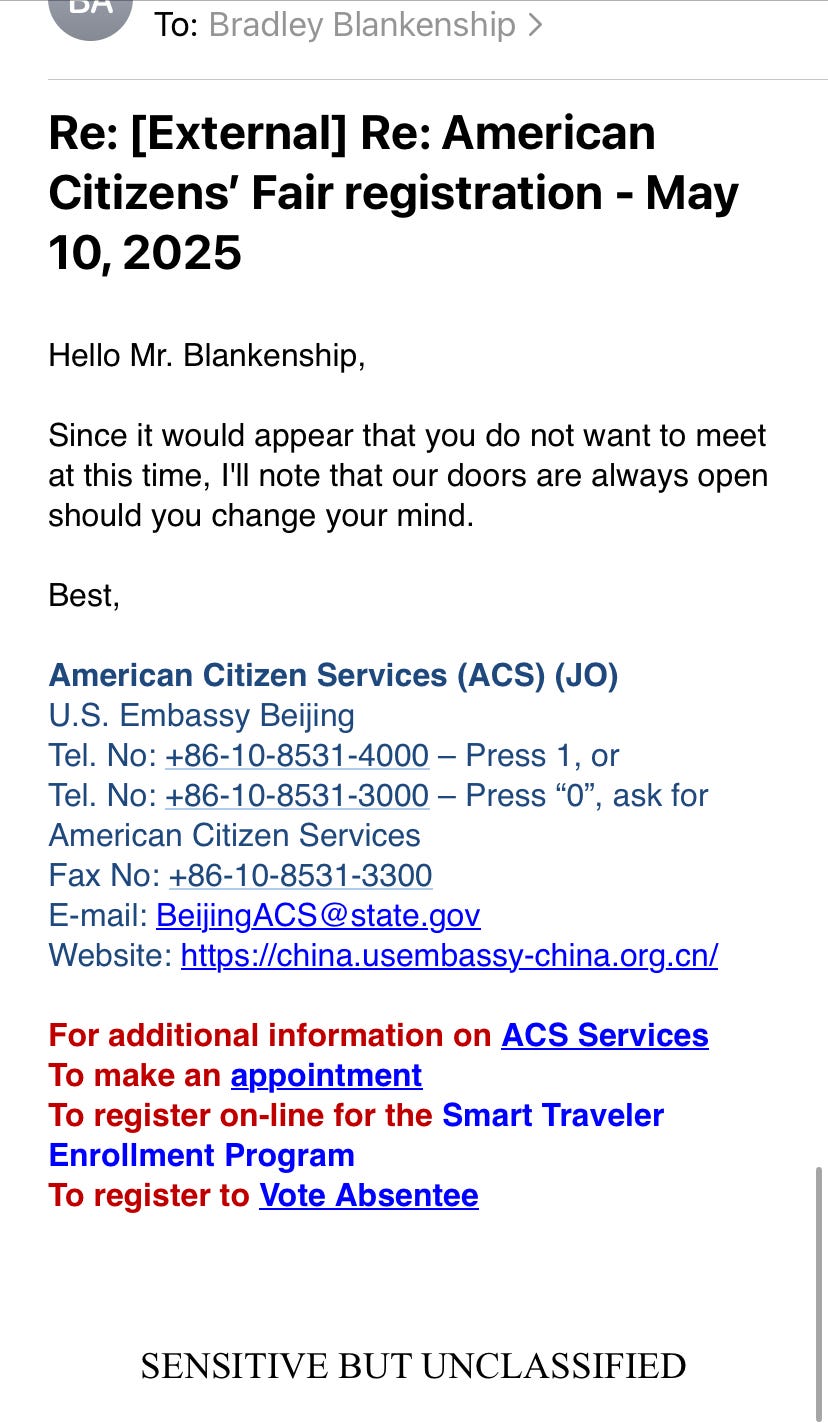The "Sensitive But Unclassified" Designation: A Legal and Intelligence Analysis of the U.S. Embassy’s Response to My Case
An analysis of the U.S. Embassy’s use of “Sensitive But Unclassified,” its legal basis, interagency implications, and function as a strategic containment posture under federal and international law.
Disclaimer: This analysis reflects the currently available facts and should not be interpreted as a definitive statement on the status of my interactions with the U.S. federal government. Additional information is expected by the end of June.
Today, I received formal correspondence from the U.S. Embassy in Beijing via American Citizens Services. The message followed a series of prior communications in which I raised concerns that the embassy had been filtering or ignoring my emails since February—conduct that may violate 22 U.S.C. § 4802(a)(1)(D), which mandates the protection of U.S. citizens abroad from “malicious harassment,” and 22 C.F.R. § 71.1, which requires consular officers to communicate promptly and effectively with U.S. nationals.
The embassy’s reply was marked “Sensitive But Unclassified” (SBU)—a designation used for material that, while not classified under Executive Order 13526, is still restricted due to the potential for substantial harm to governmental operations if improperly disclosed. (Side note: It is highly irregular—and telling—that the U.S. government applied a ‘Sensitive But Unclassified’ designation to an email sent directly to a civilian. This label is typically reserved for internal handling, not citizen correspondence, and its appearance here suggests institutional panic, not protocol.)
I. The Legal Meaning of “Sensitive But Unclassified”
According to federal policy, “Sensitive But Unclassified” refers to information that:
“Merits protection pursuant to statute, regulation, or agency policy, but does not meet the standards for classification under Executive Order 13526.”
— 44 U.S.C. § 3552(b)(3), FIPS 199, and NIST SP 800-60
This designation applies to information which, if publicly disclosed, could:
Cause “foreseeable harm to the interest of the government, law enforcement, or national security” (per DHS and DOJ policy),
Involve personally identifiable information (PII) or sensitive threat assessments,
Or present reputational or operational risk to institutions involved.
Critically, SBU is not a “non-response.”
It is an internal protection mechanism used when:
A U.S. citizen has triggered interagency review,
Their communications may involve foreign governments or international law,
And the State Department or other agencies require heightened caution in how that individual is handled.
In other words, it is the bureaucratic equivalent of “approach with gloves.”
II. Intelligence Implications of the Embassy’s Posture
From an intelligence and diplomatic perspective, the use of the SBU designation, coupled with a prior offer for a closed-door, off-the-record meeting with no legal guarantees, signals a multi-tiered institutional response consistent with internal damage control.
Specifically, the embassy’s conduct likely reveals:
Interagency Coordination
The use of an SBU label suggests internal routing through:The Bureau of Diplomatic Security (DS),
Possibly the Bureau of Intelligence and Research (INR),
Legal advisors in Consular Affairs, and
Security cooperation entities (including Legal Attachés from the FBI).
It is highly unlikely this designation was used without cross-consultation, given the international disclosures involved.
Avoidance of Official Record Creation
The suggestion of a closed-door meeting, absent guaranteed constitutional protections or written assurances, reflects a counterintelligence posture, not a consular one. It suggests that the U.S. government:Acknowledges I possess credible, possibly explosive information,
Seeks to contain narrative escalation,
And is unwilling to trigger Freedom of Information Act (FOIA) traceability or congressional oversight.
Perception of Strategic Threat
Given that I:Submitted evidence to the United Nations Human Rights Council,
Provided information to Chinese authorities,
And publicly disclosed allegations involving U.S. law enforcement personnel and organized crime figures,
It is almost certain that I am being treated not as a consular case, but as a national security variable—not because of violence or instability, but because of information control risk.
III. Legal and Strategic Implications for Whistleblower Rights
Under 5 U.S.C. § 2302(b)(8), and the Intelligence Community Whistleblower Protection Act (ICWPA), U.S. citizens and federal employees reporting:
Gross mismanagement,
Abuse of authority,
Or violations of law—
—are protected from retaliation and entitled to procedural review.
While I am not a government employee, I have exercised my right to:
Submit evidence to law enforcement (which they failed to act on),
Seek recourse via international legal bodies,
And protect my own life from retaliatory violence and coordinated reputational harm.
If all of this is true (and I believe it is), then the use of SBU, in this context, undermines my rights as a U.S. citizen. It constitutes an effort to control the narrative without affording me due process, or offering transparency regarding what is known, withheld, or internally acknowledged.
This behavior may rise to the level of:
Constructive exile (denial of access to domestic protection while abroad),
Procedural bad faith by State Department actors,
And potential violation of international obligations under the Universal Declaration of Human Rights and related whistleblower protections under UN frameworks.
IV. Conclusion: A System That Recognizes, But Refuses to Respond
The “Sensitive But Unclassified” label applied to my communications does not reflect concern for safety, accuracy, or law.
It reflects a fragile institution caught in its own inertia.
When the federal government:
Marks a citizen’s warnings as “sensitive,”
Declines to act on criminal allegations,
And attempts informal backchannel resolution—
—it reveals not strength, but potential legitimacy collapse.
This is the bureaucratic equivalent of blinking.
(I am seeking a FOIA regarding this development and will share my findings, unless they are denied on national security grounds).



